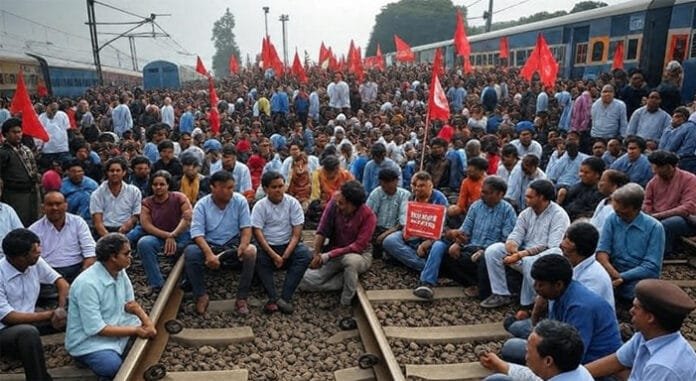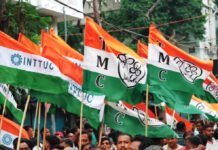India is witnessing a powerful wave of industrial action as several major trade unions, along with public sector workers, have called for a nationwide strike on Wednesday. The protests are expected to paralyze a wide range of essential services, with disruptions expected in banking, insurance, postal, coal mining, highways, and railways. Central and regional unions are united in opposing the new labor codes, the privatization of PSUs, and are demanding the reinstatement of the old pension scheme, along with a minimum wage of ₹26,000 per month.
Banks, Post Offices, and Rail Services Hit by Coordinated Strike
We are witnessing major interruptions in banking services across public sector banks, particularly in metro cities and state capitals. Multiple branches remain closed as employees affiliated with INTUC, CITU, AITUC, and other unions have joined the strike. ATM operations in rural and semi-urban areas have been affected due to shortage of operational staff.
Post offices are also witnessing reduced operations. Mail delivery, parcel movement, and counter services have been severely hit as unionized postal workers joined the all-India strike call. The Indian Railways is facing localized disruptions with protesters blocking train tracks and staging sit-ins at several regional hubs. Though not a full rail shutdown, passenger delays and goods train halts are reported from Bihar, Jharkhand, West Bengal, and parts of Uttar Pradesh.
Protesters Warn of Roadblocks and Rail Halts
The Centre of Indian Trade Unions (CITU) has clearly stated that the strike action will extend to chakka jams (roadblocks) in major industrial belts. CITU National Secretary AR Sindhu has warned that roads will be blocked, and trains will be stopped in several parts of the country as part of the protest escalation strategy.
In states like Punjab, Tamil Nadu, West Bengal, and Maharashtra, union-backed worker rallies are moving toward highway junctions and railway crossings. The movement of cargo and essential supplies may be delayed in districts where roadblocks are active. Industrial towns such as Ludhiana, Durgapur, Coimbatore, and Jamshedpur are witnessing massive turnout.
Electricity Workers Join in Uttar Pradesh: Blackout Threat Looms
Adding further pressure, electricity employees in Uttar Pradesh have launched a separate but parallel strike protesting against privatization of power distribution and the contractualization of workforce. With linemen, engineers, and administrative staff off duty, power outages and maintenance delays are likely, particularly in rural districts of eastern UP. Officials have warned that if the strike continues beyond 24 hours, blackouts may intensify due to a shortage of technical manpower.
17-Point Charter of Demands Led by Central Trade Unions
The striking bodies are united under a 17-point charter of demands, spearheaded by CITU, INTUC, AITUC, and others. Their core demands include:
Abolition of all four new labor codes enacted by the central government.
Roll-back of PSU privatization, including those in oil, telecom, and defense sectors.
Minimum wage increase to ₹26,000 per month for all industrial and service sector workers.
Restoration of the Old Pension Scheme (OPS) for all government employees.
Legal guarantee of Minimum Support Price (MSP) based on the Swaminathan Commission’s C2 + 50% formula.
Loan waiver for small and marginal farmers.
Reinstatement of permanent jobs, ending mass contractualization in public departments.
Full funding for NREGA, ensuring 200 days of work and minimum wages for rural workers.
Job regularization for Anganwadi, ASHA, and midday meal workers.
This comprehensive list reflects a deep-rooted dissatisfaction with current labor and social policies. Protesters argue that workers and farmers alike are being sidelined in the name of reform.
Left Parties and Farmers’ Groups Extend Support
Support for the strike is also flowing in from farmers’ organizations, especially Samyukta Kisan Morcha (SKM) and NREGA Sangharsh Morcha, both of which are mobilizing rural support. SKM has issued a joint statement backing the demands and is organizing solidarity protests in village blocks.
In Ranchi, a day before the strike, a torchlight procession was held by a joint platform of leftist parties and trade unions. Starting from Sainik Market and concluding at Albert Ekka Chowk, the protest march saw slogans against the central government’s anti-labor stance. Protesters accused the ruling administration of diluting worker protections, ignoring pensioners, and aggressively pushing disinvestment.
BMS Distances Itself, Calls Strike Politically Motivated
Interestingly, the Bharatiya Mazdoor Sangh (BMS), a trade union affiliated with the RSS, has chosen to stay out of the strike. In a statement, BMS labeled the protest as “politically motivated”, claiming that the opposition-backed unions are exploiting labor issues for electoral gains.
This non-participation has created a rift in the national labor movement, but it has not weakened the strike’s turnout. In many areas, non-affiliated workers are still showing up in large numbers, driven by shared concerns about job security, pensions, and economic hardships.
Urban and Rural Impact of the Strike
The strike is having ripple effects in both urban financial centers and rural production zones. In Delhi, Kolkata, Mumbai, Chennai, and Bangalore, public transport has been delayed due to union rallies. In districts of Odisha, Telangana, MP, and Bihar, local government offices remain closed, and village-level banks and health sub-centers are barely functional.
Construction work under government projects has also slowed, with daily wage laborers refusing to show up. Workers in mining regions like Dhanbad, Singrauli, and Korba have joined the agitation, leading to decreased coal production.
Logistics and E-Commerce Face Disruptions
With roads blocked and warehouse workers striking in hubs like Bhiwandi, Patna, and Guwahati, e-commerce deliveries are being delayed. Online grocery and medicine platforms are issuing service alerts in Tier-II cities, citing labor unrest as the key reason. Freight trucks carrying essential items have also reported halts due to temporary highway closures enforced by demonstrators.
Government’s Response and Contingency Measures
The central government has issued advisories to state administrations to ensure law and order, while also activating emergency teams in banks, power grids, and transport. Helpline numbers and digital services are being promoted to offset disruption. However, these stopgap efforts may not be enough if the agitation extends.
Some state governments have threatened to invoke ESMA (Essential Services Maintenance Act) to prevent complete shutdowns, though no formal notification has been issued yet.
Outlook: Is This the Beginning of a Larger Movement?
The magnitude of this strike, especially the cross-sector participation, signals a growing alliance between labor and farmer movements. With demands deeply rooted in both economic and legislative discontent, this may be the precursor to larger, more sustained agitations leading into the upcoming budget and policy sessions.
As the day progresses, the nationwide trade union strike is expected to gain further momentum, with more unions and civil society bodies expressing solidarity. Mass rallies, picketing, and road-rail disruptions are set to continue into the evening.
We will continue to monitor updates from key centers across India as this historic labor strike unfolds.
















